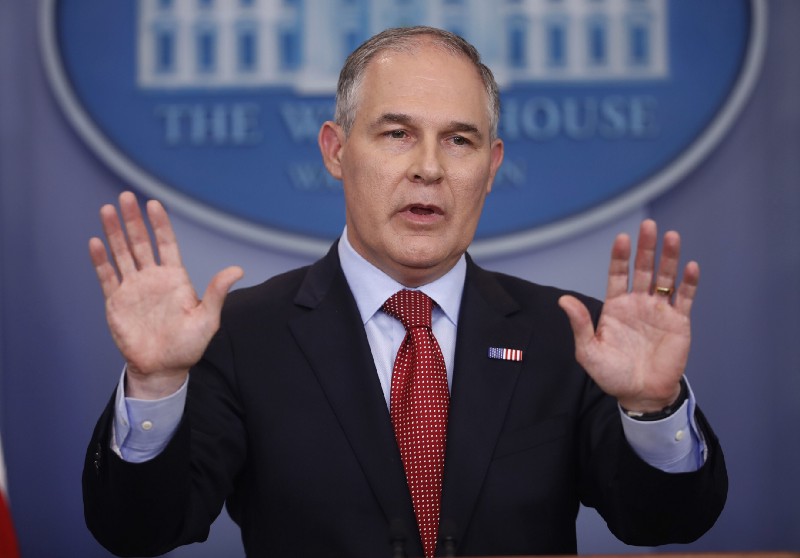Environmental Protection Agency Administrator Scott Pruitt has made no secret about his intention for the agency that he oversees. Since his confirmation in February, he has touted his “back to basics” agenda, meant to “achieve clean air and clean water and… have strong economic growth and job creation at the same time.” In a matter of months, he has rolled back years of environmental regulations at the behest of industry, and has even set up an initiative to give industry lobbyists more of a say in how those industries are regulated.
These moves are, by and large, extremely unpopular. What’s more, they are simply not backed by science, which could help explain why Pruitt’s next target at the EPA is the scientific advisory board meant to help guide the agency’s regulations. On Tuesday, in an unprecedented move, Pruitt announced that no scientists who had received EPA funding would be eligible to serve on the agency’s Science Advisory Board, which provides scientific and technical expertise regarding environmental regulations.
“Process matters,” Pruitt said during the announcement on Tuesday at EPA headquarters. “As we engage in rule making… we also need to respect the record, the science, that we are relying on to make decisions.”
He went on to add that no scientific adviser should appear to have a conflict of interest with the agency.
“They will have to choose: either the grant, or service, but not both,” Pruitt said.
But far from combating conflicts of interest within the agency, former Science Advisory Board members and scientific watchdog groups worry that Pruitt’s changes will simply flood the agency with scientists representing regulated industries and conservative states, a shift that would help lend an air of scientific credibility to Pruitt’s anti-regulatory agenda.
“He is recomposing what science advice at the EPA looks like,” Joe Árvai, director of the Erb Institute at the University of Michigan and former Science Advisory Board member, told ThinkProgress. “When he asks science advisers to weigh in on matters that will be of national importance — a pressing public health matter, for instance — he could be loading the science advisory boards with people who are sympathetic to his anti-science, politically-driven agency agenda.”
A leaked list of potential new Science Advisory Board members include names like John D. Graham, dean of Indiana University’s School of Public and Environmental Affairs who pushed for environmental deregulation under the George W. Bush presidency, and Anne Smith, managing director of NERA Economic Consulting, a firm that has done extensive work with groups pushing against environmental regulations. An official list of nominations will be released sometime next week, Pruitt said during his announcement.
The Science Advisory Board historically advises the EPA on scientific and technical details related to specific agency proposals, though the board is not required to weigh in on every issue, nor are its recommendations necessarily the final word on an issue. The Obama administration, for instance, asked the Science Advisory Board for advice on the Clean Water Rule but not the Clean Power Plan. Thus, the advisory board can essentially be used by an administrator to rubber stamp proposals that, without scientific backing, might seem overly controversial — which is what environmental groups fear will happen with Pruitt’s deregulatory agenda.
“Pruitt doesn’t want to support science or hear from anyone who is respected in the scientific community, because science makes clear that Pruitt‘s policies are disastrous for the health of our kids and our communities,” Sierra Club executive director Michael Brune said in a press statement. “For Pruitt, anything that helps corporate polluters make money is good and science and facts are just roadblocks he wants to tear down.”
Pruitt’s shake-up of science advisers within the EPA is merely another step in his overarching goal: reshape the narrative around environmental regulation to support his agenda rather than the facts. It’s what he’s doing with climate change by starting an initiative aimed at challenging the mainstream consensus on climate science. It’s also what he’s doing when he refuses to grant interviews to local or potentially unfriendly media, choosing instead to speak with outlets like Fox News or the Federalist.
The impact of this kind of insular reality — where the only voices are those that reinforce Pruitt’s own deregulatory agenda — is already on full display with the agency’s approach to repealing the Clean Power Plan, the Obama administration’s plan for regulating greenhouse gas emissions from power plants.
In order to bolster its case for repealing the rule, Pruitt’s EPA changed much of the math the Obama administration used to defend its creation — from undercounting the public health benefits of reduced air pollution to devaluing the long-term benefits of climate action. Nineteen Democratic Senators have accused Pruitt of “denying the science and fabricating the math” to back up the proposed Clean Power Plan repeal. Pruitt’s math is clearly skewed in a way to make the benefits of repeal seem larger than the benefits of the regulation; if an independent advisory board were to approve of that math, it could lend an air of credibility to what would otherwise be seen as blatant political maneuvering.
“He could put cases before the Scientific Advisory Board that he really wants to make appear as though they have scientific credibility. And if that scientific credibility comes from the EPA Scientific Advisory Board, that has a very different ring to it than if it was endorsed by the Heartland Institute or the American Chemical Society,” Árvai said. “But given what he is going to the Scientific Advisory Board, they will effectively be one in the same.”
Outside the walls of the EPA, the facts about climate change and environmental pollution are clear: pollution kills, climate change is driven by human-activity, and atmospheric carbon dioxide levels continue to climb as annual temperature records continue to be broken. Unfortunately for public health and the environment, inside the walls of the EPA, a manufactured reality tells a very different story.


